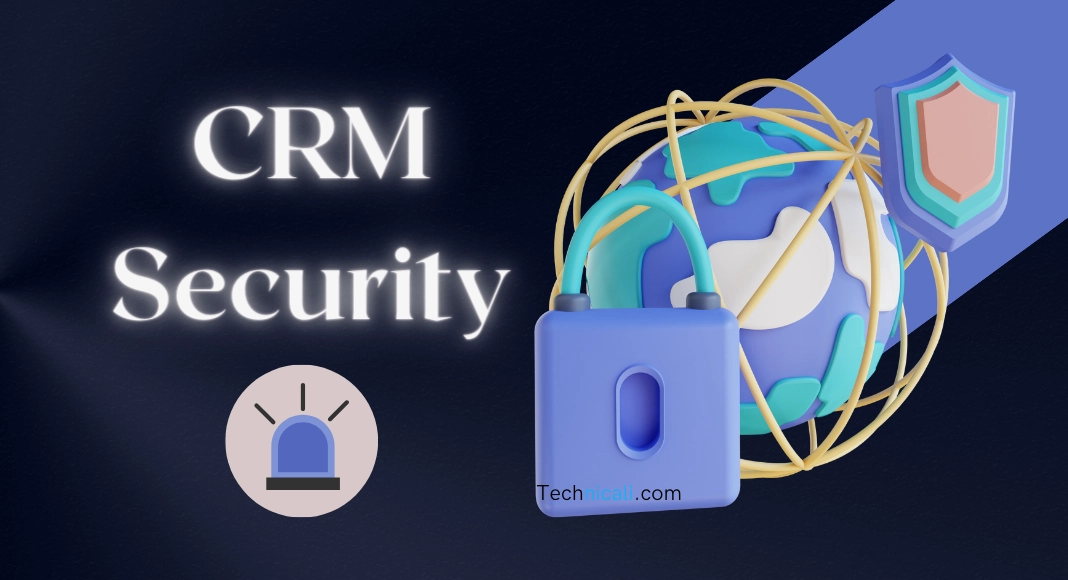In the fast-paced world of SaaS, where customer relationships are the lifeblood of your business, keeping your CRM (Customer Relationship Management) system secure is crucial. Trust us, you don’t want to end up being the laughingstock of the business world, do you? We’ll dish out valuable insights that will help you protect your precious customer data and foster growth. So, let’s get ready to navigate the wild world of CRM security together!
Contents
Understanding CRM Security
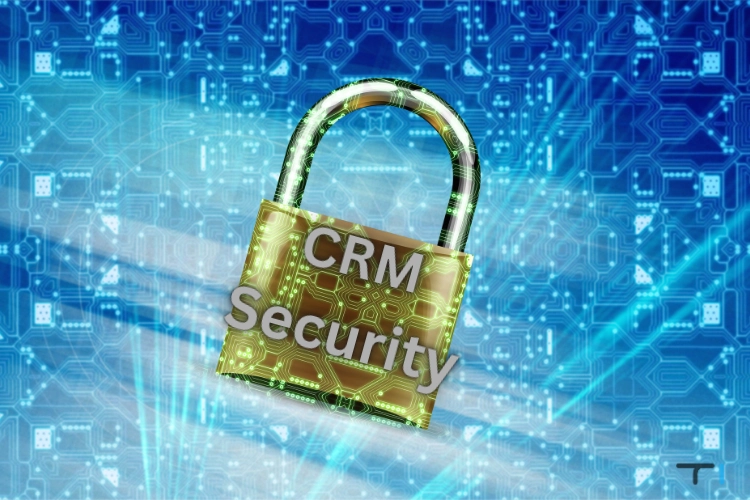
What is CRM Security?
CRM security is like a fortress that shields your precious customer data from those sneaky cyberattacks and data breaches. In this digital era where customer information is pure gold, protecting it becomes a necessity and a strategic must-do.
Your CRM system is the ultimate vault for customer data, storing a treasure trove of info, from contact details to purchase history. With CRM security in place, you can rest easy knowing this treasure remains locked away from those nosy parkers and troublemakers. Safeguard your customer data.
The Significance of Customer Data
Imagine your CRM as a vault, but instead of gold and jewels, it holds the secrets to your customer’s preferences, behaviors, and needs. It lets you personalize customer experiences, build strong relationships, and drive growth. But hold on tight because with great power comes great responsibility, and in this case, it also makes you a prime target for cybercriminals. I don’t want to scare you, but customer data breaches stain your reputation and can result in serious financial consequences. So, let’s get serious about CRM security, shall we? Understanding the significance of customer data is the first step towards taking CRM security seriously. It’s time to lock down your vault and protect what matters most.
Common CRM Security Concerns
Considering the increasing frequency of security breaches, it’s no wonder businesses have their fair share of concerns. And let’s be honest: some common CRM security concerns just keep popping up. It’s like they never go away. So, let’s take a look at these concerns:
- Data Breaches: Data breaches are a significant headache for businesses using CRM systems. These breaches can happen due to sneaky cyberattacks or even internal bloopers. The thought of customer data ending up in the wrong hands keeps CEOs and managers tossing and turning at night. Stay vigilant and keep those cyber-crooks at bay!
- Data Protection: Ensuring the protection of customer data and complying with data protection regulations like GDPR can be quite a challenge, to put it mildly. Businesses need to navigate the complexities of data handling, encryption, and privacy to avoid those dreaded fines and keep that precious customer trust intact.
- Security Vulnerabilities: CRM systems have these sneaky little vulnerabilities that cybercriminals love to exploit. It’s like a game of cat and mouse, always trying to stay one step ahead. These vulnerabilities can lurk in the software, third-party integrations, or weak user authentication measures. We’ve got to address these vulnerabilities, no matter how much they try to mess with us!
- User Access Control: Managing user access is a complex task. Balancing the need to give employees the proper access to their jobs while keeping sensitive info under wraps is no easy task. Trust me, unauthorized access can open the floodgates to data leaks and breaches.
These concerns drive home that businesses need to take CRM security seriously and implement robust security measures to protect their customer data. Who wants their precious customer data to fall into the wrong hands? Let’s be smart about this, people! Protecting customer data should be a top priority for businesses because without happy and secure customers, good luck staying in business!
Strategies for CRM Security
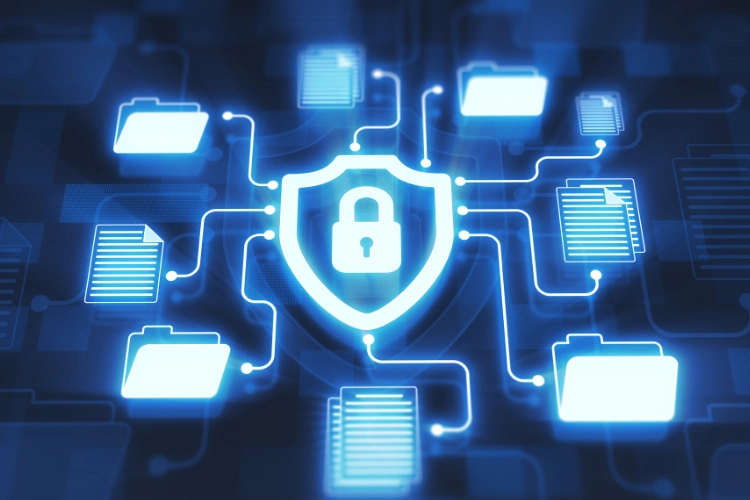
Now that we’ve established the importance of CRM security, let’s dive into some strategies to fortify your precious CRM system. Because, you know, nobody wants their CRM to be a sitting duck for hackers. We’re about to embark on an epic journey of CRM fortification.
Security Features in CRM Systems
CRM software has all these security features to keep your precious data safe. Like, they’ve got encryption and access control, all these fancy layers of defense. So, when you’re picking a CRM solution, you better ensure it has all these comprehensive security measures, ya know?
And let’s not forget about those CRM security policies and access control mechanisms; they’re like the bouncers of your system. You must implement role-based access control and two-factor authentication to improve your CRM security.
Data Protection and Privacy
Data protection is not some boring checkbox you tick just to comply with regulations. It’s a commitment, a serious commitment, to safeguarding your customers’ sensitive information. Like seriously, their stuff deserves the utmost care and respect. So, regarding your CRM system, ensure it’s equipped to handle all that personally identifiable information (PII) with the TLC it deserves.
In this section, we’ll dive deep into strategies for ensuring your data privacy game is on point within your CRM system. We’ll also talk about the implications of data protection regulations. Respecting your customers’ privacy is not just lovely; building and maintaining their trust is essential.
Cloud-Based CRM Solutions
The revolution of cloud-based CRM solutions has completely transformed how businesses handle customer data. These solutions offer scalability and accessibility but also bring some security challenges. As a SaaS business executive, you gotta tread carefully in this wild landscape.
Regular Security Audits and Updates
Regular security audits and updates are necessary to keep your CRM system in tip-top shape. We’re talking about maintaining the integrity of your system here! These security audits help you identify any weaknesses and areas that need improvement. And don’t forget to keep your CRM software and related applications up-to-date. Trust me, you don’t want to be caught with known security issues just hanging around. That’s just inviting trouble, my friends. So, let’s be proactive and minimize the risk of cyberattacks and data breaches.
Employee Training and Awareness
Human error is like a VIP guest at a security breach. Educate your employees about security best practices, the importance of strong, unique passwords, and how to spot sketchy phishing attempts. Keep them going with ongoing security training so they’re ready to dropkick potential threats. Informed employees are essential against security breaches.
Incident Response Plan
Get ready for the worst-case scenario with an incident response plan. This badass plan outlines the steps your organization should take in case shit hits the fan and you face a security breach. It’s got all the strategies to contain the breach, minimize the damage, notify the folks affected, and recover your precious data. Having a solid incident response plan in place can help your organization bounce back from any security incident.
Implementing CRM Security
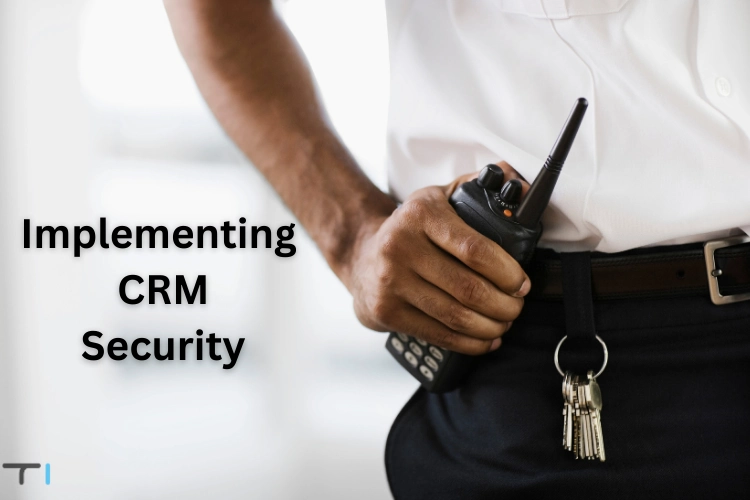
Now that you’ve got a handle on these strategies let’s dive into their practical implementation. We’ll break it down and make it super easy for you.
Access Control and User Authentication
Access control is the bouncer at the door of your CRM system, keeping out unauthorized access. Role-based access control ensures that people only get in if they have the proper position in the organization. Two-factor authentication and strong passwords? They’re like the secret handshake and secret code only the permitted people know. Gotta keep things secure, right? So remember, it’s all about access control.
Data Backup and Recovery
No security system is foolproof, my friend. You gotta be prepared for the worst by regularly backing up your data. A solid data recovery plan can save your business operations from going down the drain when a security breach or data loss happens. So, don’t wait for disaster to strike; be proactive and protect your precious data!
Monitoring and Detection
Being proactive is important for outsmarting potential security threats. So, watch your CRM system and network closely to catch any sneaky security breaches. Don’t forget to take care of those third-party applications and IP addresses.
Ensuring Customer Trust and Compliance
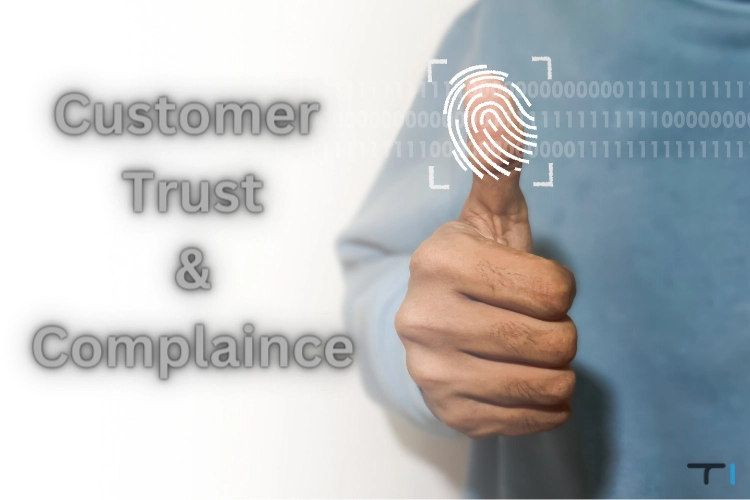
Ensure customers trust you and stay compliant with CRM (Customer Relationship Management). You don’t want to ruin those precious relationships or get on the wrong side of the law, right? So, be a responsible business and do what it takes to maintain trust and follow the rules. It’s just suitable for everyone involved. Here’s a detailed explanation of how to achieve this:
Building Customer Trust
- Transparency: When building trust, one of the most crucial things you can do is be completely transparent about handling customer data. Let your customers know exactly what’s happening! Take the time to communicate your data collection and usage policies. Don’t forget to provide them with a privacy policy that’s easy to understand. Lay it all out, from how their information will be used and stored to how you will protect it.
- Data Security: You must implement serious measures to protect customer data. I’m talking encryption, access controls, and regular security audits. When your customers know you take their data security seriously, it gives them confidence in your organization. Protect that precious customer data.
- Consent and Opt-Ins: Ensure you get proper data collection and processing consent. Let customers opt-in to data sharing and communication preferences so they feel in control of their information. Oh, and don’t forget to explain all the incredible benefits they’ll get from sharing their data!
- Data Minimization: Collect only the necessary data for your business operations and customer relationships. Avoid over-collecting information because it will give you a significant headache about data privacy.
- Data Breach Response: If you want to handle data breaches like a pro, you gotta have a solid incident response plan in place. And let me tell you, transparency is critical in these situations. So, don’t waste any time; inform those affected customers promptly! Tell them about the breach, the potential impact, and the steps you take to fix things up. Honesty during a breach can work wonders in preserving trust.
Compliance with Regulations
- GDPR Compliance: If you operate within the European Union or handle EU citizens’ data, GDPR compliance is an absolute must. So, ensure your CRM system and practices align perfectly with GDPR requirements, giving individuals the power to access, correct, and delete their data. It’s their data, after all – let them take control!
- Other Data Protection Laws: Ensure you acquaint yourself with data protection laws relevant to your region or industry. Take the California Consumer Privacy Act (CCPA) in the United States, for example. It puts some specific requirements on businesses handling Californians’ data.
- Regular Audits and Assessments: Regularly audits your CRM system to ensure compliance with relevant regulations. Seek legal counsel or consult with data protection experts to identify potential compliance gaps and address them promptly.
- Data Protection Impact Assessments (DPIAs): Performing DPIAs for high-risk data processing activities is crucial. These assessments help us spot and tackle potential privacy risks tied to specific data processing activities. You don’t want to mess around with your users’ data! So, let’s get serious and ensure we’re doing everything possible to protect their privacy.
- Documentation and Records: Maintaining meticulous records of data processing activities, consent forms, and compliance efforts is necessary. Having thorough documentation can save you from trouble if those regulatory inquiries come knocking at your door.
- Training and Awareness: Ensure employees are well-versed in data protection laws and compliance procedures. They must understand the importance of compliance and handling customer data appropriately.
- Data Privacy Officer (DPO): Make sure to appoint a Data Privacy Officer or someone who can take charge of data protection efforts within your organization. Trust me, you want someone with expertise in data protection laws and regulations to handle this.
By focusing on both building customer trust and compliance with data protection regulations, you create a rock-solid foundation for responsible CRM practices. Not only does this help you steer clear of legal troubles, but it also boosts your reputation and fosters trust among your customers. The result? Long-lasting relationships and business growth that will make your competitors green with envy. Who said playing by the rules had to be boring? Embrace the rebellious spirit and show the world you can succeed on your terms.
Future Trends in CRM Security
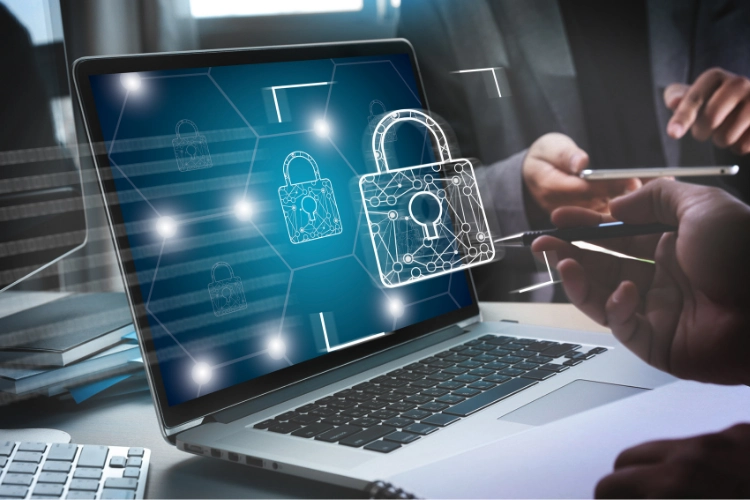
Future CRM (Customer Relationship Management) security trends are like the ever-evolving dance of cyber threats and technological advancements. Organizations must stay one step ahead to protect their customer data and earn their clients’ trust. So, what’s the secret? Well, it’s all about being on top of the game, embracing the importance of data protection, and keeping those cyber threats away. So, get ready to ride the wave of CRM security trends! Here are some key future trends in CRM security:
1. AI-Powered Threat Detection: AI and machine learning are getting in on the action regarding CRM security solutions. These intelligent algorithms can crunch through mountains of data in real-time, sniffing out weird patterns and behaviors that might spell trouble. Talk about being one step ahead! So, this proactive approach is the way to go if you’re all about staying on top of potential breaches.
2. Zero Trust Security: Zero Trust is like that friend who trusts no one, not even their shadow. It’s a security model that says, “Hey, nobody, whether they’re inside or outside the organization, should be trusted by default.” Access to resources and systems is restricted; you only get in if needed. This way, we minimize the risk of those sneaky insider threats and make it harder for those external attackers to find a way in. So, trust no one and keep that attack surface as small as possible.
3. Blockchain for Data Integrity: Blockchain technology is all the rage these days, and guess what? It’s not just for cryptocurrencies! Nope, we’re talking about using blockchain to keep your CRM data in check. With its decentralized and tamper-resistant ledger, you can record and verify changes to customer data. Say goodbye to unauthorized alterations and hello to data immutability! It’s like having a badass bouncer guarding your precious information.
4. Enhanced Authentication Methods: Traditional username-password authentication methods are so last season. They’re being ditched in favor of super-secure alternatives. Biometric authentication (like fingerprint or facial recognition), multi-factor authentication (MFA), and adaptive authentication are the cool kids now. They’re the standard practices to make sure only the right peeps get access to CRM systems.
5. Privacy-Enhancing Technologies: Privacy-enhancing technologies like differential privacy and homomorphic encryption are superheroes for protecting customer data. They swoop in to save the day by allowing organizations to analyze data without revealing sensitive information. It’s like having your cake and eating it, too – privacy and insights all in one!
6. IoT Security Integration: As the Internet of Things (IoT) keeps growing, CRM systems gotta step up and integrate some serious IoT security measures. We’re talking about locking down those devices that collect customer data and ensuring that data transmitted from IoT devices to the CRM system is all encrypted and protected.
7. Employee Training and Awareness: Employee training remains crucial regarding CRM security. With cyber threats getting fancier by the day, we must ensure our employees are up to speed on the latest security best practices. We need them to be on high alert against those sneaky phishing attacks and social engineering tactics.
8. Regulatory Evolution: Data protection regulations are constantly changing and evolving. Organizations must stay up-to-date on existing laws and new regulations. It’s not just those international GDPR rules we have to worry about. Regional laws impact how we handle data, too.
9. Supply Chain Security: Organizations are finally waking up to the fact that securing their supply chains is kind of a big deal. It’s essential to ensure those third-party vendors and partners aren’t bringing any vulnerabilities into the CRM ecosystem. That would be like inviting a bunch of troublemakers to a party and expecting everything to go smoothly. So, following robust security practices is necessary to keep those external connections in check.
10. Quantum Computing Preparedness: While quantum computing is still a baby in the tech world, it’s got some serious potential to shatter our current encryption standards. So, organizations are getting their act together and exploring post-quantum encryption methods and security protocols. Just to be prepared for the day when quantum computing decides to throw us all for a loop.
Incorporating these fancy future trends in CRM security will help organizations stay ahead of all those pesky emerging threats, protect their precious customer data, and maintain the trust of their fancy clients. Proactively investing in extraordinary security measures and committing to evolving security practices are important for mitigating the risks associated with CRM systems in this increasingly digital world.
Conclusion
As we wrap up this adventure in CRM security, remember that protecting your customer data is not just some tedious technical requirement. It’s all about earning your customers’ trust and keeping them happy. Follow those data protection regulations and stay on high alert. Let’s ensure your CRM system is a fortress that scares the cyber threats away!
FAQs
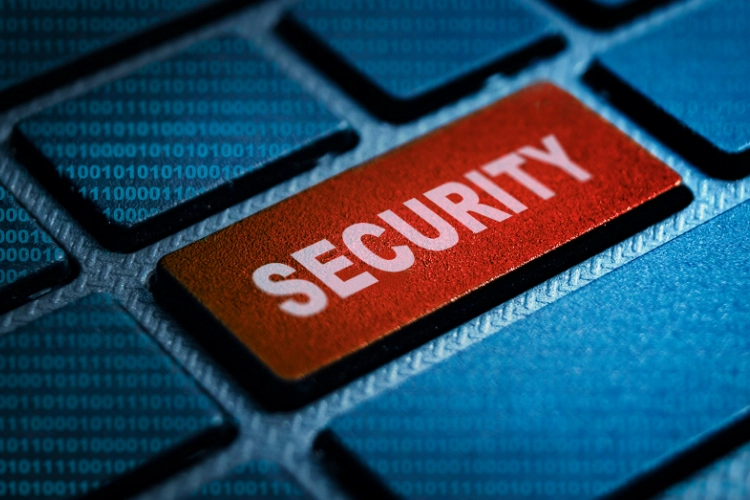
1. How can CRM security enhance customer trust?
CRM security shows your commitment to protecting customer data and earning their trust and confidence. Because customers feel safe with you when securing that precious info, be the hero your customers deserve, and they’ll reward you with their loyalty.
2. What role does data protection regulation play in CRM security?
Data protection regulations like GDPR set the standards for handling customer data. And let me tell you, complying with these regulations is not just about avoiding legal trouble. It’s about protecting your customers’ privacy and gaining their trust. Because, let’s be honest, nobody wants their info floating around the internet.
3. Are cloud-based CRM solutions secure?
Cloud-based CRM solutions have their perks regarding security, but they also bring in some new challenges. So, how do you keep your precious data safe in the cloud? Start by picking a reputable CRM vendor, setting up access controls, and closely examining potential threats.
4. How can I effectively monitor my CRM system for security threats?
To monitor any suspicious activity, it’s a good idea to regularly check for things like unauthorized access attempts or any weird data transfers. You might consider using fancy security tools and services to improve your monitoring game.
5. What are the key trends in CRM security to watch for in the future?
Future trends in CRM security are like those eccentric, successful marketers who know how to stand out. They embrace advanced security measures, rely on AI-driven threat detection, and strongly emphasize user education and awareness. Staying on top of these trends is crucial to maintain robust security.
